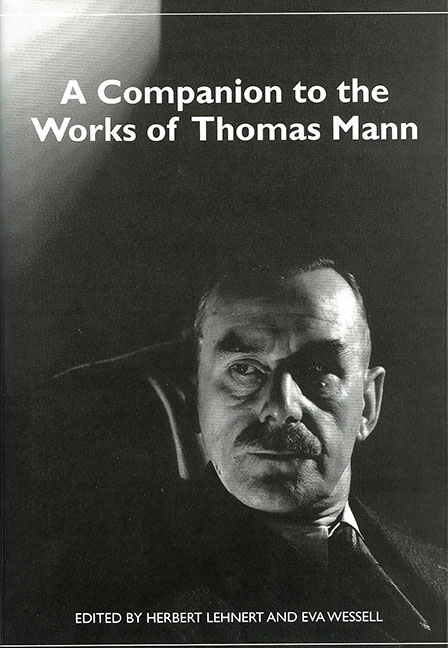Book contents
- Frontmatter
- Contents
- Foreword
- Thomas Mann's Works
- List of Abbreviations
- Introduction
- Thomas Mann's Beginnings and Buddenbrooks
- Art and Society in Thomas Mann's Early Novellas
- Love in Society: Thomas Mann's Early Stories
- “Death in Venice”
- “Mein ‘Friedrich’ — das ist was Anderes”: Thomas Mann's Unwritten Novel about Frederick the Great, King of Prussia
- Magic and Reflections: Thomas Mann's The Magic Mountain and His War Essays
- Thomas Mann's “Autobiographical” Stories
- Joseph and His Brothers
- Lotte in Weimar
- Thomas Mann's Late Politics
- “German” Music and German Catastrophe: A Re-Reading of Doktor Faustus
- The Gaze of Love, Longing, and Desire in Thomas Mann's “The Transposed Heads” and “The Black Swan”
- Felix Krull
- Female Identities and Autobiographical Impulses in Thomas Mann's Work
- Betrayed or Not Betrayed: A Testament?
- Thomas Mann's Comedies
- Notes on the Contributors
- Select Bibliography
- Index
“German” Music and German Catastrophe: A Re-Reading of Doktor Faustus
Published online by Cambridge University Press: 28 April 2017
- Frontmatter
- Contents
- Foreword
- Thomas Mann's Works
- List of Abbreviations
- Introduction
- Thomas Mann's Beginnings and Buddenbrooks
- Art and Society in Thomas Mann's Early Novellas
- Love in Society: Thomas Mann's Early Stories
- “Death in Venice”
- “Mein ‘Friedrich’ — das ist was Anderes”: Thomas Mann's Unwritten Novel about Frederick the Great, King of Prussia
- Magic and Reflections: Thomas Mann's The Magic Mountain and His War Essays
- Thomas Mann's “Autobiographical” Stories
- Joseph and His Brothers
- Lotte in Weimar
- Thomas Mann's Late Politics
- “German” Music and German Catastrophe: A Re-Reading of Doktor Faustus
- The Gaze of Love, Longing, and Desire in Thomas Mann's “The Transposed Heads” and “The Black Swan”
- Felix Krull
- Female Identities and Autobiographical Impulses in Thomas Mann's Work
- Betrayed or Not Betrayed: A Testament?
- Thomas Mann's Comedies
- Notes on the Contributors
- Select Bibliography
- Index
Summary
Arguably Thomas Mann's most self-conscious “German” book, Doktor Faustus (1947) was actually written in California, where Mann had gone to live in 1942. But as seems to be the rule with exiles, the geographical distance merely compounded the emotional involvement with the country that he had left behind in 1933, making this, as he repeatedly confessed, his most radically autobiographical novel as well as his most unsparing reckoning with Germany's past. The following analysis will proceed from the historical context that gave birth to the conception of Doktor Faustus to the novel's sophisticated design. The central sections will address crucial issues of representation: the composer as Faust and the life and works of Leverkühn. The concluding section considers the question of the intellectual debt Mann's novel owes to the theory and practice of modern music. In a brief epilogue I offer some observations from a contemporary perspective about the position of Doktor Faustus in the debate about the “German catastrophe” and about its historical significance.
Historical Context
When Mann began to write Doktor Faustus on 23 May 1943 — Serenus Zeitblom, the fictitious narrator, begins to write the story of his recently deceased friend, the composer Adrian Leverkühn, on precisely the same day — the world was in the midst of the “most destructive and barbaric war” in recorded history, a war precipitated by Mann's native country. Early in 1943, a decisive turning point was reached, and after the German surrender at Stalingrad on 2 February 1943, the writing was on the wall for everyone to see. A few weeks earlier, at Casablanca, the Western allies had set the unconditional surrender of Germany as the ultimate goal of the war. This meant, among other things, that in the eyes of the outside world there was no oppositional “other Germany”; that there existed only one Germany; and that that single Germany would be held accountable for the evil perpetrated, supposedly, in the name of its people. This was a position that Mann himself had come to embrace, slowly and reluctantly, in the course of his tireless efforts to convince America, ever since coming to the United States in 1938, of the necessity of going to war and ridding the world of Nazism.
- Type
- Chapter
- Information
- A Companion to the Works of Thomas Mann , pp. 221 - 244Publisher: Boydell & BrewerPrint publication year: 2004

